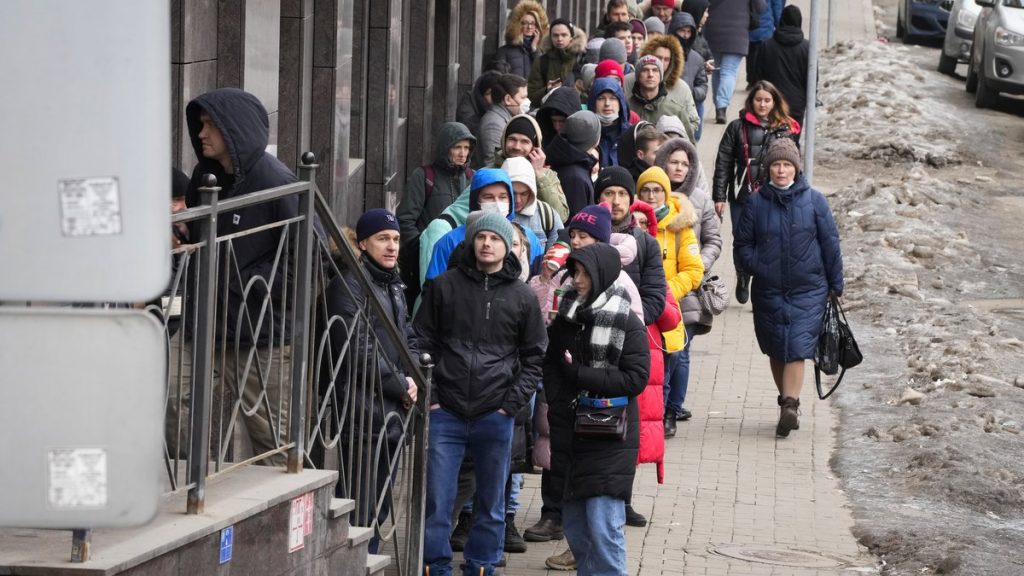In response to Russia’s invasion of Ukraine, which has caused a mass exodus from the country, as well as widespread death and destruction, NATO and especially the United States have imposed brutal sanctions, which will primarily hurt the Russian poor and working class. In this guest post, a correspondent in Moscow shares some of the developments in Russia that help us understand the situation. We publish guest posts of this sort although they do not always reflect our positions, which can be found here.
The battery of sanctions imposed on Russia by the United States and the European Union following the invasion of Ukraine will certainly hit the Kremlin oligarchs and the big energy companies that keep the country afloat. However, sanctions will also have a devastating effect on the vast majority of the Russian people, who are not to blame for the adventure Putin launched beginning on February 24.
On Monday, February 28, as a result of the export blockade of coal and steel giants such as Severstal and sanctions on much of the banking system, the ruble experienced the biggest devaluation in its history. While the exchange rate was 80 rubles per euro just a few weeks ago, it now takes between 120 and 125 rubles to buy a single euro. This is a 50 percent devaluation that will have a catastrophic impact on workers’ living conditions. Since the Russian economy imports large quantities of manufactured goods, including foodstuffs, the collapse of the national currency will immediately affect the cost of living. It also affects pensioners who, according to official figures, receive an average monthly allowance of 13 to 14 thousand rubles. They are literally at risk of starvation.
Also on Monday, people began flocking to ATMs that dispense “hard currency” in an effort to rid themselves of rubles as quickly as possible.
Unfortunately, Russians are already accustomed to sudden changes of the ruble. First during perestroika and then with the disastrous default in the summer of 1998, they saw their savings vanish. This time, though, the sanctions are here to stay for a long time, and — according to economists — their effects will unleash their full destructive character within 3 to 6 months. The collapse of the ruble will have a direct effect on the health of the population, since the vast majority of medicines (more than 70%) are imported from France, Italy, Germany, and Switzerland. Price increases — which have already begun — will keep many Russians from receiving decent treatment, as not all pharmaceuticals are covered by the national health system.
Another danger is the “brain drain” of engineers and technicians from the IT sector, who may choose to leave the country to work at Western companies for higher salaries. That is why Vladimir Putin issued an extraordinary decree addressed to these workers, assuring them that their salaries will be increased, as well as proposing the possibility of offering mortgages, at very advantageous rates, for them to purchase housing.
From the perspective of employment, the destructive effects of the sanctions are already a harsh reality. Aeroflot, the state-owned airline, has seen most of its international routes canceled and will be forced to reduce the number of flights, partly because it will no longer receive spare parts for its Boeing aircraft. The low-cost airline Pobeda is already bankrupt, as its entire fleet was leased to an Irish finance company that has now decided unilaterally to terminate the contracts. This will also affect tourism and related industries, and thousands of jobs will be lost.
There was a real blow to the automotive sector on Wednesday. Germany’s Porsche has decided to close its factory in Kaliningrad. Nissan, BMW, and Austin, the expensive high-powered cars adored by Russia’s nouveau riche, have also been forced out of the Russian market, which will spell disaster for the workers these firms employed.
The chauvinist intoxication fueled by the regime was short-lived this time, plunging millions of people into the more prosaic realities of capitalism in crisis.
First published in Spanish on March 3 in La Izquierda Diario.
Translation by Left Voice










